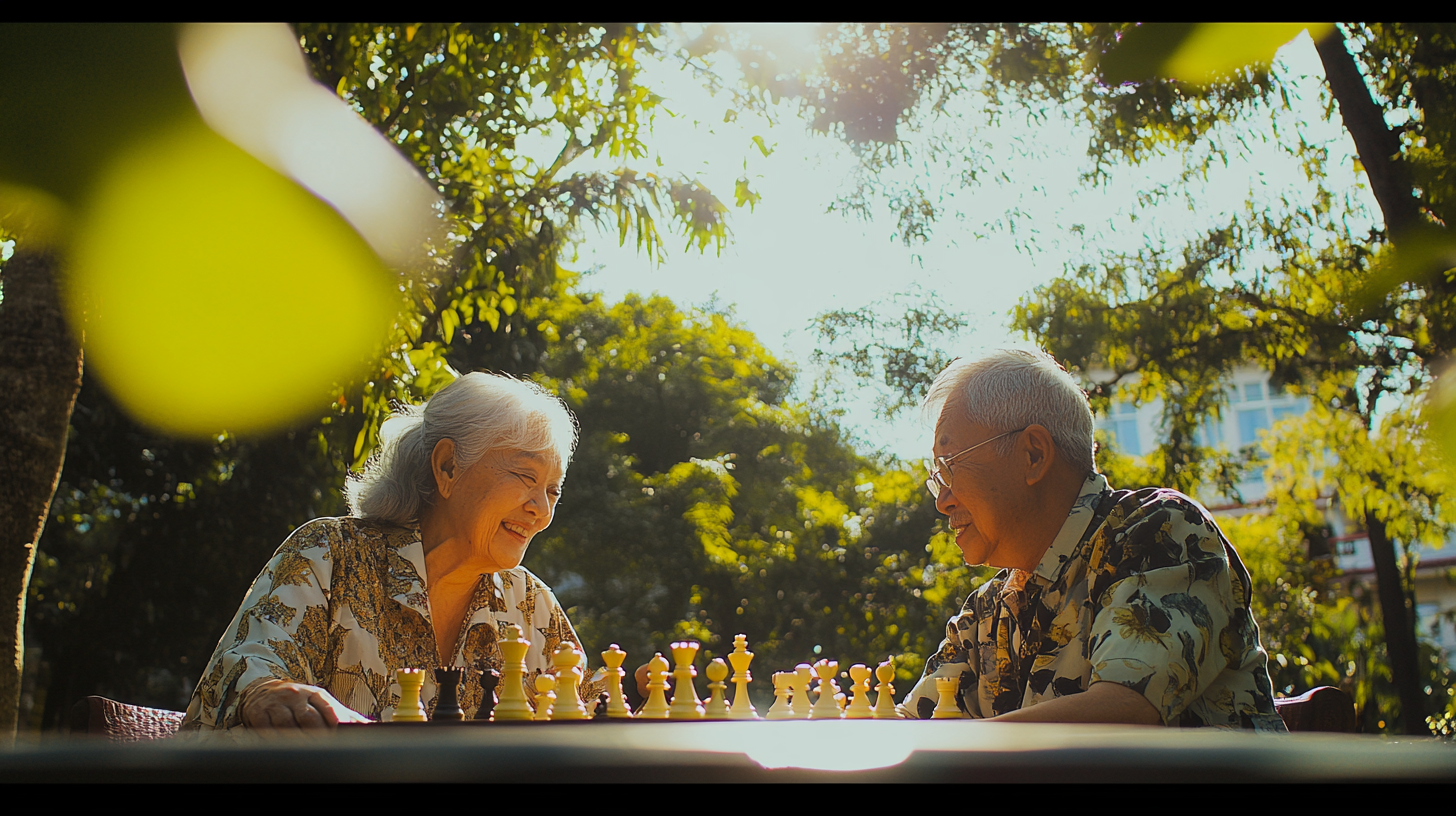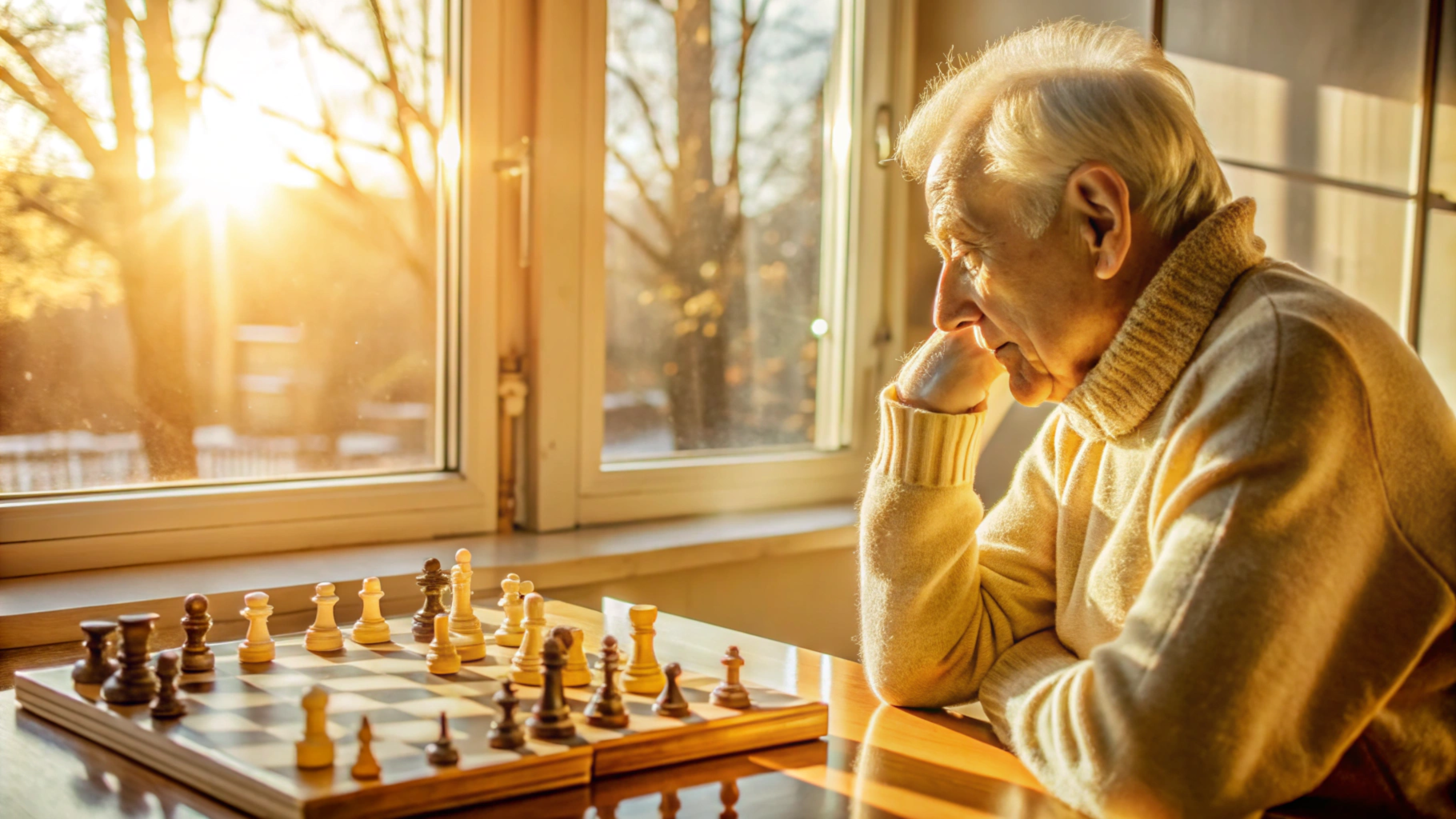Why Chess for Seniors is a Great Activity: Unlocking Health and Cognitive Benefits
Chess for Seniors is not just a game but a highly effective tool to stay mentally healthy, socially active, and emotionally sound. As age advances, cognitive health is a significant concern, and mentally challenging activities like chess offer several advantages for seniors. From enhancing memory to sharpening problem-solving skills, chess works out the brain and keeps it engaged. This game isn’t only beneficial for mental agility; it also fosters social connections and emotional well-being, creating a well-rounded approach to healthy aging. In this article, we’ll explore why chess is an ideal activity for seniors looking to enrich their quality of life.
-
Cognitive Benefits: Boosting Brain Health and Memory
Playing chess is a fantastic workout for the brain. for seniors, mentally stimulating activities like chess have been linked with better cognitive functioning as well as even a protection against cognitive loss. This is how chess works for brain function:
- Memory Improvement: Chess encourages players to remember various patterns, strategies, and moves, which helps strengthen both short-term and long-term memory.
- Enhanced Problem-Solving Skills: Chess requires strategic planning and anticipation of the opponent’s moves, promoting critical thinking and problem-solving abilities that keep the brain sharp.
- Delay of Cognitive Decline: Studies have shown that mentally engaging activities like chess may reduce the risk of age-related cognitive diseases such as dementia and Alzheimer’s.
Pro Tip: For seniors who wish to exercise their brains, try playing ongoing games of chess with friends, family, or even online communities. Long-term cognitive improvement can result from regular practice.
-
Stress Reduction and Emotional Well-being
Mental and emotional health are connected, especially at old age. Chess can help the elderly manage stress, anxiety, and even improve mood.
- Focus on the Present Moment: Chess requires full concentration, helping players temporarily forget about worries and enjoy the moment. This focused mental engagement is a form of mindfulness that promotes relaxation.
- Sense of Achievement: The game is challenging yet rewarding, which can give seniors a sense of accomplishment, building confidence and emotional resilience.
- Boosted Happiness through Social Play: Playing chess with others can foster positive interactions and reduce feelings of loneliness, especially for seniors who may feel isolated.
Pro Tip: Many senior centers and civic organizations have chess clubs or activities in which seniors are able to play the game in a non-competitive and friendly atmosphere. Socialization of chess is a great mood elevator and method of meeting new friends.
-
Social Interaction and Community Building
Social contact is an integral part to maintaining mental well-being. Chess is a platform through which elderly can engage with people, exchange stories, and build new relationships.
- Community Engagement: Chess clubs and groups provide a sense of community where seniors can connect, support one another, and make friends.
- Improved Communication Skills: Discussing strategies, moves, and experiences with fellow players helps improve communication skills, which is beneficial in maintaining mental agility.
- Intergenerational Connection: Chess is a game that bridges generations, making it an excellent way for seniors to connect with younger family members or community members, fostering a sense of belonging.
Pro Tip: For seniors who might not be able to visit local chess clubs, online sites provide virtual chess games and communities where players can engage with other players across the globe, giving them a sense of belonging.

-
Emotional Resilience: Learning from Wins and Losses
Chess is a game that stimulates patience, determination, and the ability to learn from mistakes. For seniors, this translates to greater emotional resilience, essential later in life.
- Acceptance of Challenges: Chess often involves setbacks, which encourage players to handle challenges with grace and patience.
- Learning from Mistakes: Each game provides opportunities for self-reflection, helping seniors learn from losses and celebrate small victories.
- Increased Emotional Control: Chess teaches seniors to manage emotions, avoid impulsive decisions, and stay calm under pressure.
Pro Tip: When playing chess, top after each game and consider what went well and what did not. This reflective practice enhances self-awareness and emotional toughness.
-
Physical Benefits: Keeping Active and Engaged
While chess is a brain game, it also has physical benefits that aid in creating general good health.
- Fine Motor Skills: Moving chess pieces and handling the board requires precise hand-eye coordination, which can help improve fine motor skills.
- Reduced Sedentary Time: Setting aside time for regular chess games provides a structured activity, encouraging seniors to avoid prolonged periods of inactivity.
- Reduced Blood Pressure: By promoting relaxation and reducing stress, chess may indirectly contribute to lower blood pressure, which is beneficial for heart health.
Pro Tip: Try playing chess as a part of a balanced routine that includes regular physical activity, like walking, stretching, or light exercises, to promote both physical and mental well-being.
-
Accessibility and Flexibility: A Game for All Abilities
One of the advantages of chess for seniors is that it’s versatile and accessible. It can be played almost anywhere and does not require physical exertion, making it ideal for individuals with limited mobility.
- Online and Digital Options: Many online chess platforms allow seniors to play from the comfort of their homes, either against a computer or with players from around the world.
- Adaptable for Different Skill Levels: Chess offers endless learning opportunities, and players can choose to play at their preferred pace and skill level.
- Portable and Easy to Set Up: A simple chess board is all that’s needed to start a game, making it a convenient option for seniors who want an engaging activity on hand.
Pro Tip: Find chess apps and websites that offer beginner through expert levels of playing, tutorials, and even analysis of moves to allow seniors to play chess at their own level of comfort.
-
Building Mental Discipline and Focus
Chess requires patience, logical thinking, and focus for long hours. All these skills play a role in building mental discipline among older adults and have a positive impact on other aspects of life.
- Improved Attention Span: Chess challenges players to focus intently on the game, helping to increase attention span over time.
- Enhanced Planning and Foresight: The game teaches players to think several steps ahead, which can improve planning and decision-making skills.
- Greater Patience: Chess rewards patience and careful planning, helping seniors develop these traits even outside the game.
Pro Tip: For seniors who are new to chess, start with the basics of movement and progress to more complicated strategies. This makes learning fun and ensures a steady improvement of planning and concentration.

Guide to Starting Chess for Seniors
For seniors, chess might be a stimulating exercise and entertaining profession that not only contributes to the development of mental faculties but also to good mental health. Playing chess helps develop focus, enhances problem-solving skills, and provides a systematic method of challenging the mind. In addition, the social aspect of the game may get rid of loneliness by bringing individuals with a common interest together.
But for beginners, the game might first appear complicated and intimidating. The sheer variety of possible moves, strategies, and rules may give the impression that learning to playing chess is a challenge. Fortunately, chess can be tailored to fit any level of proficiency. With proper strategy and materials, seniors can gradually transition into the game without feeling pressured or overwhelmed.
- Simplified Games: If you’re new to chess or haven’t played for a while, starting with simplified versions of the game or using fewer pieces can help. This allows you to become familiar with the rules and gradually build confidence in your skills.
- Using Puzzles and Tactics: Chess puzzles allow you to focus specifically on problem-solving skills and various strategies. By solving these puzzles, you can gradually improve your abilities and reach a higher level of play.
- Memory Practice: Regularly playing chess helps improve your memory. Remembering different movement patterns and strategies enhances both short-term and long-term memory. To start, focus on recalling simple moves, and as time progresses, you can remember more complex patterns.
Pro Tip: If you’d like an effortless beginner experience, then you should employ the use of chess websites or applications that guide you through learning gradually and seeing your improvement. Such resources likely offer adjustable puzzles that can be customized according to your level of proficiency, offering you a fun and comfortable chess experience.
Challenges and Opportunities: Overcoming Barriers and Maximizing Benefits
While chess offers numerous cognitive, emotional, and social benefits for older adults, there are also some challenges that may be faced in learning and playing the game. These challenges may be discouraging for beginners at times, but with the right mindset, they can be transformed into valuable opportunities for personal growth, intellectual stimulation, and social engagement.
Challenges:
1. Initial Learning Curve
For seniors who are completely new to chess, the game’s complexity can feel overwhelming. Learning the rules, understanding piece movements, and grasping strategic concepts like openings, tactics, and endgames require patience and practice. The vast number of possible moves in each game may lead to decision fatigue, making it difficult for some beginners to stay engaged.
🔹 How to Overcome It:
- Start with the basics, focusing on individual pieces and their movements before diving into full games.
- Use visual aids, such as diagrams and video tutorials, to reinforce learning.
- Practice with simplified games or puzzles that emphasize one concept at a time.
- Play at a slow pace, using online platforms that allow for turn-based play over extended periods.
2. Physical Limitations
Elders with fine motor problems, i.e., tremors or arthritis, may have difficulty placing physical pieces into position accurately. Visual disabilities also may blur the distinction between not being able to distinguish pieces on a typical chessboard and cause mistake and frustration.
🔹 How to Overcome It:
- Use larger, weighted chess pieces that are easier to grasp and move.
- Opt for chess sets with high-contrast colors for better visibility.
- Play digital chess on a tablet or computer, where piece movement is effortless and customization options improve accessibility.
- Explore voice-command chess software that allows moves to be spoken rather than physically played.
3. Access to Resources and Social Play
Not all seniors are able to attend chess clubs, face-to-face lessons, or even own the equipment to play online. Limited opportunities to play face-to-face can lead to a lack of motivation or disconnection.
🔹 How to Overcome It:
- Seek out local community centers or libraries that offer chess programs for seniors.
- Play correspondence chess via mail or digital platforms that allow for long-term, relaxed gameplay.
- Encourage family members to participate in chess games, creating bonding opportunities.
- Look for local tournaments or senior-friendly chess groups that promote a welcoming environment.
Opportunities:
Despite these challenges, learning chess as a senior presents numerous opportunities for mental growth, social connection, and an improved quality of life.
1. Adapting the Game for Beginners
Older adults can enjoy chess without stress by starting with less complicated versions of the game. By advancing gradually, they can gain confidence and experience a feeling of achievement with each improvement.
✅ How to Maximize This Opportunity:
- Play mini-games with fewer pieces to focus on specific strategies.
- Use coaching software that provides hints and suggestions during play.
- Engage in interactive lessons that progress step by step rather than overwhelming the learner with advanced strategies.
2. Technology and Online Platforms
The growth of online chess sites has facilitated learning and participation in chess more than ever before. The elderly can play in the comfort of their homes without traveling while still enjoying valuable games with participants globally.
✅ How to Maximize This Opportunity:
- Utilize chess apps that offer adaptive difficulty, voice instructions, and slow-paced turn-based games.
- Join virtual chess clubs and participate in friendly matches or instructional sessions.
- Take advantage of online coaching, where lessons are personalized based on skill level and goals.
3. Building New Communities and Friendships
Chess provides an excellent environment for socialization, keeping the elderly active and at bay from loneliness. Either in person or through internet clubs, playing chess with other people guarantees contact and a healthy mind.
✅ How to Maximize This Opportunity:
- Attend local chess meetups in senior centers or community clubs.
- Join social chess groups online, participating in discussions and group matches.
- Encourage multigenerational play, where grandchildren or younger family members engage in friendly chess sessions, creating a bridge between generations.
Pro Tip: Online forums, local chess clubs, or family gatherings provide an appropriate platform for addressing initial difficulties related to the game of chess by elderly people. The game is both accessible and enjoyable, considering its long-term benefits, if one allows time for their need-based adjustment in the game.
Chess for Seniors opens doors to improved mental health, deeper social connections, and a sense of accomplishment with every move. For seniors, playing chess provides an enjoyable, accessible way to stay engaged, whether with friends, family, or online communities. The benefits of chess go beyond the board—it promotes mental clarity, resilience, and a renewed zest for life. By incorporating chess into a daily or weekly routine, seniors can embrace a fulfilling, active lifestyle that keeps the mind and spirit vibrant at any age. Whether as a fun pastime or a powerful tool for lifelong learning, chess truly is a game for all stages of life.
Recommended Articles:
- Chess Therapy for Seniors : Memory and Cognitive Health Improvement
- 6 Effective Chess Strategies for Boosting Short and Long-Term Memory
- Mastering Chess for Seniors | Your Complete Guide



0 Comments